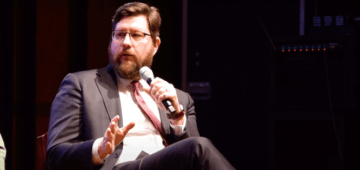 Patrick Iber interviews Matt Duss in Dissent:
Patrick Iber interviews Matt Duss in Dissent:
Since 2017, Matt Duss has served as the foreign policy advisor to Senator Bernie Sanders. From that position, Duss, who has a background in U.S.–Middle East policy, has been able to draw attention to issues—such as how U.S.-supplied arms to Saudi Arabia are contributing to humanitarian catastrophe in Yemen—that often go unchallenged. But his path to his current position was an unusual one. In this interview, which has been edited for length and clarity, we talk about how his background informs his thinking, what the Biden administration is doing well and where it should be doing better, and how to build a more robust infrastructure for progressive foreign policy.
Patrick Iber: Why did you become interested in foreign policy?
Matt Duss: A few reasons. First, my father’s family are refugees from Ukraine. He was born in a [displaced persons] camp in Germany after the Second World War and came as a young child to the promised land of Greenpoint, Brooklyn. I grew up in Nyack, New York, but I spent a lot of time down in Brooklyn with my grandparents. Interacting with the community of Polish and Ukrainian and Russian immigrants in Greenpoint, hearing the conversations that took place around the table even if I wasn’t aware of their full political scope, gave me an awareness and interest in the wider world. Then, when I was ten years old, our family spent a year living in the Philippines while my parents both worked in a processing center in Bataan for Vietnamese and Cambodian refugees, who were fleeing in the wake of the Vietnam War. It was a very interesting time to be in the Philippines. It was the Ferdinand Marcos era; I was there when [opposition leader Benigno] Aquino was assassinated. It was also interesting to observe the Cold War from that vantage point. Korean Air Lines Flight 007 was shot down [by the Soviet Air Forces] when I was there. Two global superpowers eyeing each other with their hands on their guns certainly feels different when you aren’t behind them. I think those experiences planted an interest in international affairs.
More here.
